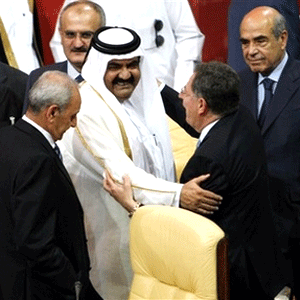The Doha Meeting: A Win-Win Situation for All Lebanese
Finally after five days of intense negotiations, last week the Lebanese groups reached an agreement in Doha to end the crisis in their country which was about to inflame the entire Lebanon.

Finally after five days of intense negotiations, last week the Lebanese groups reached an agreement in Doha to end the crisis in their country which was about to inflame the entire Lebanon.
The problem started with the decisions made by the Lebanese government to declare as illegal the Hezbollah communication network as well as to dismiss the head of the security division of the Beirut airport. Hezbollah considered these decisions as crossing its red line. In an interview on the situation, Hassan Nassrollah, the leader of Hezbollah, said that we will cut off the hands of anybody who assaults the weapon of the resistance.
The May 7 fighting in Beirut between the pro-government and opposition forces, which lasted only for a few hours, ended up with the victory of the opposition. The fighting in a few other cities followed the same pattern. With the decision of the government to abolish its controversial decisions, the opposition forces accepted to withdraw from the cities and leave them to the Lebanese Army.
The Doha accord included two important agreements. The first relates to the establishment of a unity government, in which the government coalition will have 16 ministers, the opposition will have 11 ministers and Michel Suleiman as the new President will select 3 ministers. The second agreement refers to the parliamentary elections law which will be the Elections Law of 1960. Furthermore, the participants agreed that they should not resort to weapons in order to further their political ends.
During the Doha meetings, a rumor was spread in the region to the effect that the U.S. and Saudi Arabia were encouraging the government not to accept any formula unless it includes a provision for the disarmament of Hezbollah. The prolongation of the talks was, therefore, attributed to this approach which made it impossible for the Hezbollah to accept.
Whether this rumor contained any truth or not, the fact of the matter was that before and during the crisis both the U.S. and Saudi Arabia were very vocal in defending the government while attacking Iran for supporting Hezbollah. During the Arab Ministerial meeting, the Saudi Foreign Minister exchanged tough remarks with the Syrian delegate and made very harsh remarks about Iran accusing it of intervening in the internal affairs of Lebanon. The U.S., for its part, continued with its usual attack on Iran and Syria for, what it called, fomenting the situation in Lebanon.
Following the Doha meetings, analysts made different appraisals of the outcome of the negotiations and mostly talked about the winners or losers of the situation. Some considered government’s acceptance of the formula for formation of the unity government and reaffirmation of the 1960 Elections Law as victory for the opposition. Some, on the other hand, concluded that the reference to non-use of force by different groups was a victory for the government and its supporters.
The outcome of the Doha meetings was a win-win situation for all. The Lebanese people as a whole were the winners. The Lebanese groups proved their intellectual maturity and wisdom by not allowing the opportunity for a compromise to be missed. No one can deny the positive contribution of the Qatari government particularly the Emir of Qatar for closing the gaps between the positions of the parties. In the absence of Arab powers like Egypt and Saudi Arabia in the talks, the small country of Qatar made a big stride towards the achievement of peace and tranquility in Lebanon.
To confront formidable challenges facing Lebanon, including the continued occupation of the south by Israel and its threats against Lebanese sovereignty and territorial integrity, it is incumbent upon the Lebanese people from different spectrum to work together to build their country and once again make Lebanon a strong country. The others are duty bound to support the recent agreement reached in Doha. A prosperous and peaceful Lebanon, where people from all religions and tendencies enjoy their rights, will serve the interests of all.

